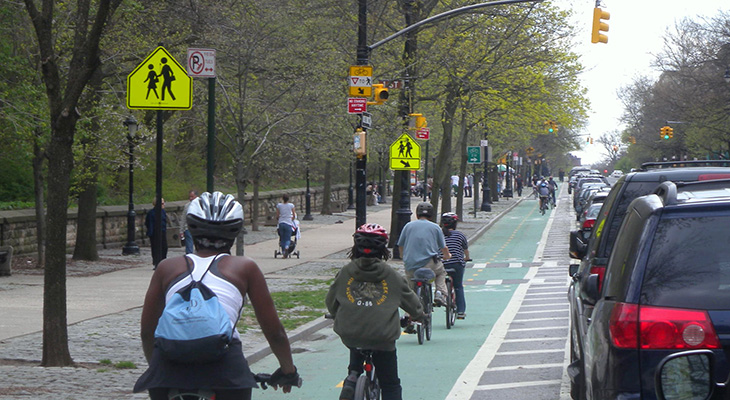Climate Change May Spell More Traffic Fatalities

Looking south at Prospect Park West protected bike lane on a cloudy midday.
(Inside Science) -- When gasoline prices fall or the economy grows, people may have more money to spend, but there can be an unexpected downside. Traffic fatalities often increase because additional drivers take to the roads. Now, economists have established that another seemingly auspicious occurrence has a dark side: nice weather.
That's the surprising finding from a pair of economists, who investigated how climate change may affect traffic accident rates in the United States over the next century. They announced their results this month at the annual meeting of the American Economic Association in San Francisco.
The researchers analyzed data from about 46 million police-reported accidents from 20 states, daily travel logs of 207,455 households, and weather from 2,607 stations in the United States between 1990 and 2010. Not surprisingly, they found that when the temperature is below freezing or if it’s raining or snowing, the risk of accidents involving property damage or injuries increases.
While warm weather had little to no effect on those types of accidents, the researchers did find that fatalities rose as the weather improved -- by 9 percent on days with temperatures above 80 degrees Fahrenheit compared to days with temperatures between 50 and 60 degrees Fahrenheit.
"It's a striking result that we didn't expect," said co-author Benjamin Leard, an environmental economist at Resources for the Future (RFF), an environmental economics think tank in Washington, D.C.
In search of an explanation, Leard and co-author Kevin Roth, an environmental economist at the University of California, Irvine, looked to the travel logs, which included information about walking and biking, as well as driving. They found that half of the effect appeared to be due to people taking advantage of the warm weather to walk, bike, or ride motorcycles -- modes of transportation that provide less protection in a crash, said Leard.
To explore how climate change could affect traffic fatalities, the researchers applied their results to a "middle-of-the-road" future climate scenario, which estimates a 4 degrees Celsius rise in global temperature by the end of the century, detailed in the 2007 report by the Intergovernmental Panel on Climate Change. The recent Paris climate deal maintains that global average temperature should be kept "well below" 2 degrees Celsius above pre-industrial levels to avoid catastrophes such as food shortages and mass extinctions of plants and animals. Many scientists believe the Earth will exceed 2 degrees of warming despite the new deal's aims.
In their analysis, the researchers predict that as the planet warms, there will be a net increase of about 650 traffic fatalities—mostly pedestrians, cyclists and motorcyclists -- each year in the U.S. by 2100. Their findings have not yet been formally peer-reviewed by the academic community.
Still, there are roughly 30,000 traffic fatalities every year in the U.S. While an additional 650 each year "isn't huge" said Leard, "it isn't trivial either." Measures that reallocate street space for cyclists and pedestrians could prove useful in curbing the additional deaths, he said.
In all, the economists estimate that the additional traffic accidents will end up costing society a total of $58 billion across the country by the end of the century. That’s comparable to similar estimates of the cost of the effects of climate change on crime, published last year in the Journal of Environmental Economics and Management, said Leard.
The research assumes that transportation as we know it today will look the same a hundred years from now. But self-driving cars, already under development, may avoid accidents better than their human-operated counterparts, no matter the weather. If the technology becomes commonplace, that could drastically reduce the total number of traffic accidents -- including those related to the weather -- and render the economists' projections too high. No matter how driving changes this century, there would still likely be a number of accidents that occur that would not have happened if temperatures had not increased.
And the research doesn’t explore other ways the changing climate could affect transportation in the U.S. in the near future -- from creating more potholes due to different cycles of freezing and thawing to extreme rainfall events or rising seas washing out roads and bridges.
"While it's true that the weather has some impact on accidents and fatalities, it's climate change's impacts on our transportation infrastructure that's really something to think about,” said T. Donna Chen, a transportation engineer and economist at the University of Virginia, in Charlottesville, who wasn't involved in the research.
Still, the results highlight an important pathway for how climate change could affect the transportation sector and the economy that has so far been overlooked, said Maximilian Auffhammer, an environmental economist at the University of California, Berkeley, who also wasn't involved in the research. "The research gives you an estimate of the magnitude of the challenge if nothing changes." And extending the analysis to other countries could prove that the cost in human lives and damages is actually much higher, he said.

